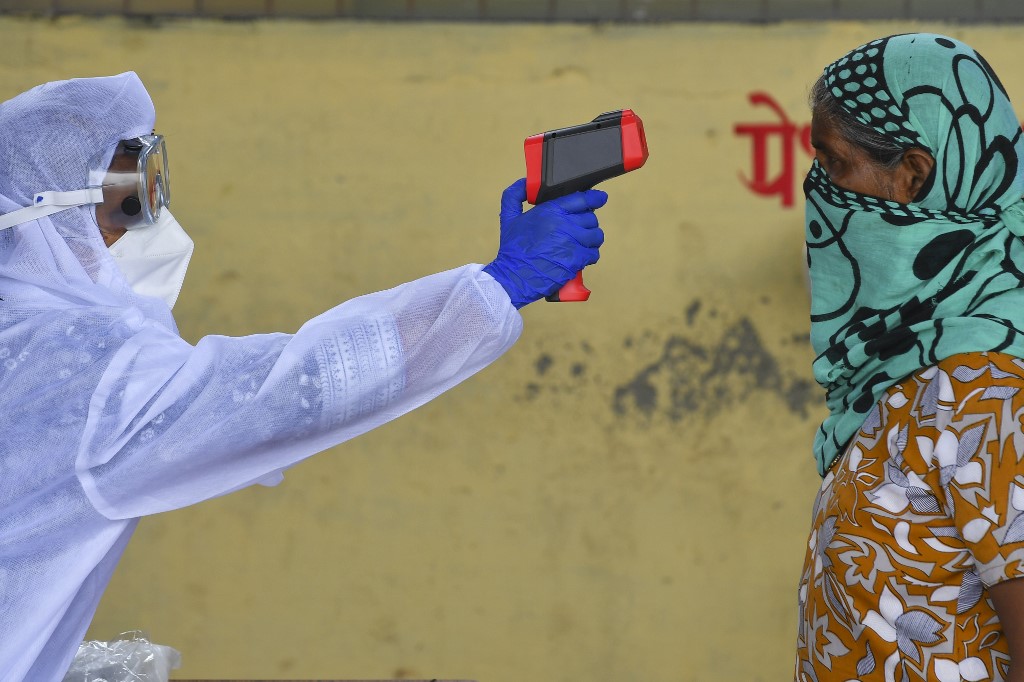Here are the latest developments in Asia related to the coronavirus pandemic:
India lockdown extended
India – home to the world’s largest anti-virus lockdown, affecting 1.3 billion people – has extended the measure through the end of May, after recording its biggest single-day jump in cases.
Schools, places of worship, shopping malls, cinemas and gyms must remain closed, and domestic and international air travel will remain suspended, the home ministry said.
But in a bid to ease the economic pain, restaurants will now be allowed to operate for takeaway services. Sports complexes and stadiums are permitted to host events – but without spectators.
Nepal extended its lockdown until June 2, after recording its second death. Both countries have been on lockdown since late March.
Virus takes toll on Bangladesh police
More than 2,000 police officers in Bangladesh have been infected with the coronavirus after tens of thousands were deployed around the country to enforce a lockdown, officials said.
A police source said at least eight officers had died and 2,384 have been infected with the virus.
Belgium has deadliest month since WW2
Coronavirus brought Belgium its deadliest April since World War 2 last month, according to a new study as the country begins slowly to lift lockdown measures.
A total of 14,790 people died in Belgium last month as Covid-19 swept the nation – substantially higher than the normal April total of deaths below 9,000, researchers from VUB university in Brussels found.
Not since the Nazi occupation of the 1940s has Belgium seen such a high mortality rate in April, the month when high winter death rates usually drop off with the onset of spring, the researchers found.
“Mortality in Belgium is exceptionally high, reaching unprecedented levels, especially in the period from 1 to 12 April,” the university said in a statement.
April 10 saw 639 deaths, “more than double the number that would have been expected for that day”.
“April 2020 was the deadliest April since the Second World War, both in absolute numbers and per capita,” it said.
There were 15.7 deaths per 1,000 population last month, said Professor Patrick Deboosere of the Interface Demography research group that produced the study. This compares with 16.3 deaths per 1,000 population in April 1941.
Belgium has been hit hard by the pandemic, suffering one of the world’s highest per capita death tolls, though the virus appears to be easing and lockdown restrictions are starting to be lifted.
The government has also been praised by the World Health Organization for keeping more accurate tolls than some of its neighbours, and the per capita rate may be higher because of this.
Russia has second-highest cases in world after US
Russia said on Monday under 9,000 new coronavirus cases had been recorded for the first time since early May as anti-virus restrictions ease and officials say the situation is stabilising.
Health officials reported 8,926 new infections in the last 24 hours, bringing the country’s total to 290,678, the second-highest in the world after the United States.
It was the lowest number of new virus cases since May 1, when Russia announced 7,933 cases.
Russia’s consumer health watchdog chief Anna Popova said this weekend that the growth in new cases was slowing and the country has “moved towards the level of stability that we’ve all been waiting for”.
Russia began easing nation-wide lockdown restrictions last week and announced the national football league would restart in late June.
Health officials also announced 91 new deaths, down from Saturday’s figure of 119 that was the highest daily toll yet.
Russia’s total fatalities now stand at 2,722, a rate considerably lower than in many other countries hit hard by the pandemic.
Critics have cast doubt on Russia’s low official mortality rate, accusing authorities of under-reporting in order to play down the scale of the crisis. Russian health officials say one of the reasons the count is lower is that only deaths directly caused by the virus are being included.
Deputy Prime Minister Tatiana Golikova over the weekend denied manipulation of numbers, saying hospitals had a financial interest in identifying infections because they are allocated more money to treat coronavirus patients.
Authorities also say that since the virus came later to Russia, there was more time to prepare hospital beds and launch wide-scale testing to slow the spread.
Long queues as Thai malls reopen
Shoppers flocked to Thailand’s top-end malls, eager for retail therapy in a gradual easing of restrictions to revive the virus-ravaged economy.
Hundreds of masked customers passed through temperature checks and disinfection stations, and had their photos taken before they were allowed into plush malls in Bangkok.
China’s second wave warning
A top Chinese medical official said the country faces a potential second wave of coronavirus infections due to a lack of immunity among its population.
“The majority of… Chinese at the moment are still susceptible of the Covid-19 infection, because (of) a lack of immunity,” Zhong Nanshan, the public face of the government’s response to the pandemic, told CNN.
“We are facing (a) big challenge,” Zhong added. “It’s not better than the foreign countries, I think, at the moment.”
Aussie jails see spike in ‘special deliveries’
Prisons in Australia have seen a spike in drugs intercepted in mail since visits were suspended due to the coronavirus outbreak, with substances concealed in letters, cards and even a child’s painting, officials said.
Corrective Services NSW, which operates prisons in Australia’s most populous state of New South Wales, said contraband had been seized from 135 mail items in April – compared to a monthly average of around 22 in 2019.
Hamster tests show masks reduce coronavirus spread: scientists
Tests on hamsters reveal the widespread use of face masks reduces transmission of the deadly coronavirus, a team of leading experts in Hong Kong said.
The research by the University of Hong Kong is some of the first to specifically investigate whether masks can stop symptomatic and asymptomatic Covid-19 carriers from infecting others.
Surgical masks were placed between the two cages with air flow travelling from the infected animals to the healthy ones.
The researchers found non-contact transmission of the virus could be reduced by more than 60% when the masks were used.
AFP
























